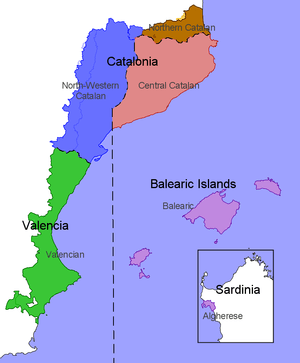Northern Catalan
Northern Catalan (Catalan: català septentrional, pronounced [kətəˈla səptəntɾiuˈnal], also known as rossellonès) is a Catalan dialect mostly spoken in Northern Catalonia, but also extending in the northeast part of Southern Catalonia in a transition zone with Central Catalan.
| The Catalan / Valencian cultural domain |
|---|
 |
|
Language
|
|
People
|
|
Geo-political divisions
|
|
Government and politics
|
Like other Eastern Catalan dialects, unstressed /a/ and /e/ are realized as schwa [ə], and [u] substitutes unstressed /o/. It has only five stressed vowels, the smallest number of any Catalan dialect: /i e a o u/.
There are some instances of historic stressed /o/ that has changed to /u/: canigó > canigú.
As in Balearic dialect, final a is not pronounced in words ending with ia if the stress is before the penultimate syllable.
Some subdialects keep the singular masculine definite article lo, as in North-Western Catalan and many varieties of Occitan.
Northern Catalan has a large body of words imported from French and Occitan. It also features some grammatical forms and structures that are typical of Occitan, such as the use of a lone post-verbal pas, rather than a lone preverbal no to express basic negation (Northern Catalan canti pas vs. Central Catalan no canto, 'I don't sing' or 'I'm not singing'); pas is also used in some other Catalan dialects for emphasis but always with no before the verb (Central Catalan no canto pas, 'I do not sing' or 'I am not singing').